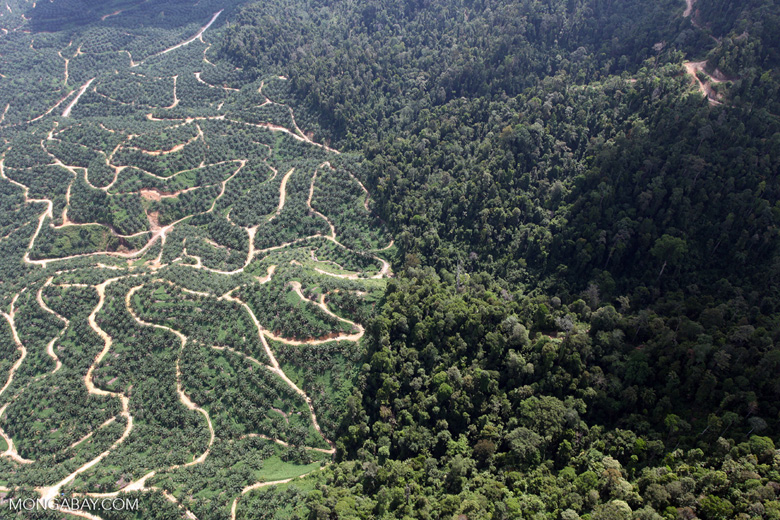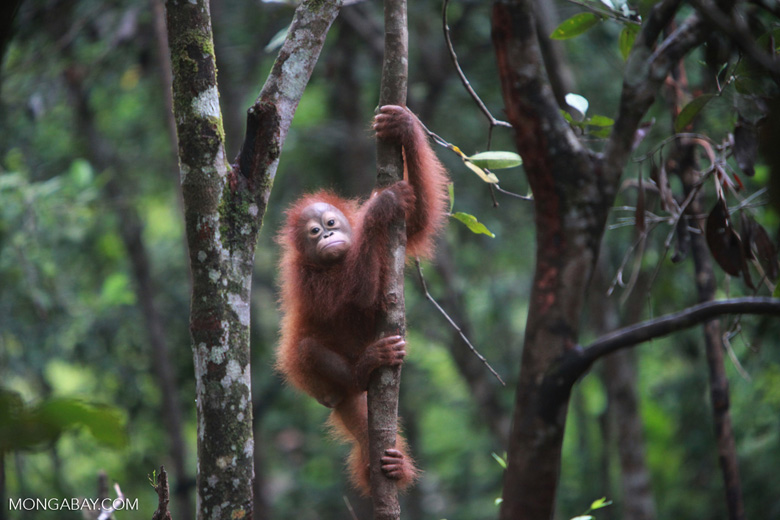By T. Joseph Cravens. Because orangutans are already threatened by habitat loss and illegal hunting in Indonesia, the additional vulnerabilities placed on them by COVID-19 and the pandemic response indicates that economic interests should not take precedence over biodiversity principles if the survival of our critically endangered cousins is to remain the priority that it should always be. As the protection of orangutan habitat in Indonesia is one of the major impediments to their conservation and welfare, it is important to emphasize how COVID-19 response affects current conservation efforts and how to proceed in a post-pandemic world.
Despite significant deforestation since the 1950s where the country has lost almost half of its rainforest, Indonesia has some of the world's most intact and diverse tropical rainforests on Earthand has the highest level of biodiversity in the world (Republic of Indonesia Ministry of Environment and Forests, 2020). Although scientists and conservationists consider the Leuser Ecosystem (KEL) in North Sumatra to be among the most important rainforests in Southeast Asia, with over 10,000 species of plants and 200 species of animals, including orangutans (Hanafia 2019), recent studies have found that only 6.5% of global forests are currently protected (Kimbrough, 2020).
With millions of people currently living in or in close proximity to KEL who depend on forest resources as their main source of food, livelihoods, and income-generating activities, the ecosystem is already under significant human pressure (Buiskool. 2020), and the increasing lack of livelihood alternatives incurred by COVID-19 also makes it easier for developers of palm oil and rubber plantations to purchase the aforementioned land from these poverty-stricken communities and ultimately hinders conservation efforts.

Photo by Rhett A. Butler Mongabay.
Despite being granted protected status by the Government of Indonesia in 2007, followed by several years of slight decreases in deforestation, illegal poaching and logging in KEL have escalated since the beginning of the COVID-19 pandemic, with palm and pulpwood plantations expanding by taking advantage of infrastructure developments (Jong, 2021). Oyvind Eggen of the Rainforest Foundation Norway insists that this increase is related to lockdown measures, stating, “Where the government and NGO presence is reduced, it clears the way for illegal activity” (Fair, 2020). In addition, there was an $8-billion increase in Indonesian deforestation-linked bank investments during the COVID-19 pandemic (Mongabay, 2020). With an average deforestation rate of 3000 acres per year, it is estimated that these forests will be completely destroyed within two decades (Buiskool, 2020; Hanafia, 2020).
Given the recent increase in environmental, economic, health-related, demographic, social, and political hardship faced by these communities, with the recent COVID-19 response serving as a backdrop, there is increasing awareness of the link between human health and the ecosystem (Buiskool, 2020), and that empowering and supporting forest-edge communities, who are the front-line regarding nature conservation, is key to ensuring the integrity of these areas.
As habitat protection and conservation go hand-in-hand, and collaboration between the public and private sectors is essential for success, it is encouraging to note that the country’s elected officials and institutions are taking steps to align the sectors. “To avoid biodiversity loss and ecosystem deterioration,” states the Government of Indonesia’s Ministry of Environment and Forests, “the government will focus from 2020 forward on strengthening the conservation of plant and wild animal biodiversity and ecosystems...in collaboration with local governments, private sector stakeholders and local communities” (Republic of Indonesia Ministry of Environment and Forests, 2020).
There are signs that the alignment of sectors is paying off. The United States Agency of International Development (USAID) cites the recent five-year LESTARI project (2015-2020) in Indonesia as an “opportunity to recognize USAID’s collective achievements with the Government of Indonesia in reducing greenhouse gas emissions from land use in both biodiverse and carbon-rich landscapes” (Rabold, 2020). The key success of the LESTARI is the effectiveness of the collaborative approach in engaging the local forest communities in taking on the stewardship of the forests.
A recent study shows that poor farmers in these communities are less likely to clear forests when receiving financial assistance and that government-subsidized poverty-alleviation programs (PKH) in Indonesia were just as successful as dedicated conservation programs in reducing deforestation (Jong, 2020), even though the program does not include environmental protection as a requirement for qualification.
In addition to resolving the aforementioned land-use conflicts, Indonesia’s Low Carbon Initiative Development (LCDI) 5-step plan to restore the country’s rain forests includes: extending forests and peatland moratorium/bans on oil palm and other agricultural expansion into primary forest and peatlands; using new financial models for the conservation and restoration of forests most needed for protection, such as rewarding states for maintaining their forests; improving agricultural value chains and reducing food loss and waste by improving infrastructure and market accessibility, leading to increased incomes and training for farmers who in turn will be more likely to pursue more sustainable practices; and increasing nutrition and food security efforts by encouraging healthier diets and addressing malnutrition and obesity (Mumbunan and Davey, 2019). However, many experts claim that the LCDI’s plan to transform rainforests into a carbon sink by 2030 (Mumbunan and Davey, 2019) is unrealistic, given the current pace of deforestation and policies that still allow for a substantial forest clearing for agriculture (Jong, 2021b).
Other measures being taken include an increased focus on community well-being, which encourages the diversification of sustainable livelihoods by ensuring social protection through access to education, healthcare, and other basic needs. With a major untapped tourism potential for KEL as an international destination, The European Union and the Government of Indonesia have already sponsored $18 million for the construction of six new airports in and around Leuser for easy transport between sectors (Global Conservation, 2016).
Encouraging local participation through activities such as community-based ecotourism (CBE), where stakeholders take part in the decision-making process of CBE activities and the conservation of community forests, provides a sense of ownership of these forests. Community-based ecotourism is a popular means of ensuring a sustainable livelihood and increasing the well-being of communities living near protected areas, such as national parks, while conserving nature and biodiversity (Buiskool, 2020).

Photo by Rhett A. Butler Mongabay.
However, COVID-19 has presented a challenge by emphasizing the vulnerability of this strategy, with travel restrictions inducing a significant decrease in income for communities that depend on tourism for their livelihoods, which in turn affect conservation efforts. According to Leif Cocks, founder, and president of The Orangutan Project, revenue from great-ape tourism has decreased during the pandemic, while the need for conservation has increased, creating a funding crisis (Minh, 2020).
It also is encouraging to note that one of Indonesia’s most prominent palm oil growers, KPN (formerly known as Gama Plantation), has announced a plan to atone for past deforestation by rehabilitating an area half the size of New York City through peat rewetting, reforestation, and helping local communities gain tenure and rights (Jong, 2021c). This is encouraging given that other recent research has revealed that the funding for communities to secure tenure rights and manage forests is significantly below what is required (Hernandez, 2021).
Forestry patrolling is also essential to the protection of these habitats. Enforcement of laws regarding illegal logging, which is the most common environmental crime handled by the Indonesian foreign ministry, largely focuses on perpetrators on the ground. In response, law enforcers are calling for a financial crimes approach that designates illegal logging as a commodity and focuses on abusers higher up the financial chain (Arumingtyas, 2021). The nonprofit organization, Global Conservation(.org) is currently funding to employ Global Park Defense systems in KEL. These systems include expanded ranger stations and patrols, UAV drones, satellite communication, and remote monitoring. Currently, 12 SMART Patrols cover 60% of KEL (Global Conservation, 2016).
Rudi Putra, a well-known Indonesian conservationist, began his work in KEL in 2000, founded the Leuser Conservation Forum (FKL) in 2013, and in 2014 received the Golden Environmental Prize for his efforts towards the reforestation of illegal palm plantations. The FKL currently has 28 teams patrolling the KEL daily, along with forest rangers from Mount Leuser National Park (Hanafiah, 2021). COVID-19 has also presented challenges to these efforts, with wildlife rangers and other patrols unable to mobilize as normal due to the pandemic. Putra remains optimistic, noting the resiliency of KEL and nature’s ability to heal itself even without human intervention (Global Conservation, 2016).
Conclusion:
Mohamed bin Zayed, who funds worldwide conservation projects, recently surveyed his grantees and found that 67% said that the pandemic has negatively affected their efforts and that many are not afield now due to the pandemic. In a recent study conducted by Zayed and associates (the MTB Fund), it was learned that the lockdown measures are harming efforts to protect biodiversity worldwide (Mubarek, 2020). In a post-COVID-19 world, Zayed believes that it is essential that, just as other sectors and industries lobby for assistance, as nature’s first responders and the voice of biodiversity interests, conservationists and NGOs such as the Orang Utan Republik Foundation must advocate for a “nature recovery plan” to subsidize efforts needed to make up for lost time due to the pandemic response (Mubarek, 2020).
References:
Hanafiah J, 2019. Restoring Sumatra’s Leuser Ecosystem, one small farm at a time. https://news.mongabay.com/2019/09/restoring-sumatras-leuser-ecosystem-one-small-farm-at-a-time/
Kimbrough, 2020. Only 6.5% of global forests are adequately protected, study finds. https://news.mongabay.com/2021/03/only-6-5-of-global-forests-are-adequately-protected-study-finds/
Republic of Indonesia Ministry of Environment and Forestry, 2020. The State of Indonesia’s Forests 2020. https://kemlu.go.id/download/L1NoYXJlZCUyMERvY3VtZW50cy9Eb2t1bWVuX0luZm9ybWFzaS9UaGUlMjBTdGF0ZSUyMG9mJTIwSW5kb25lc2lhJTIwRm9yZXN0JTIwMjAyMCUyMEV4ZWN1dGl2ZSUyMFN1bW1hcnkucGRm
Buiskool, 2020. In Sumatra, forest edge communities must be at the center of conservation efforts (commentary. https://news.mongabay.com/2020/09/in-sumatra-forest-edge-communities-must-be-at-center-of-conservation-efforts-commentary/
Hanafiah, 2020. Poaching in Indonesia’s biodiverse Leuser Ecosystem on the rise amid COVID-19. https://news.mongabay.com/2020/05/wildlife-poaching-indonesia-leuser-covid19-tiger-orangutan-rhino/
Jong, 2021. ‘Hungry’ palm oil, pulpwood firms behind Indonesia land-grab spike: Report. https://news.mongabay.com/2021/02/palm-oil-pulpwood-firms-behind-indonesia-land-grab-agrarian-conflict-spike-report/
Fair, 2020. COVID-19 lockdown precipitates deforestation across Asia and South America. https://news.mongabay.com/2020/07/covid-19-lockdown-precipitates-deforestation-across-asia-and-south-america/
Mongabay, 2020. Banks increased deforestation-linked investments by $8B during Covid-19: report. https://news.mongabay.com/2021/06/banks-increased-deforestation-linked-investments-by-8b-during-covid-19-report/
Rabold, 2020. Indonesia’s LESTARI Project: From Village Empowerment to Landscape Conservation. https://www.climatelinks.org/blog/indonesias-lestari-project-village-empowerment-landscape-conservation
Jong, 2020. Helping the poor can protect forests too, Indonesian welfare program shows. https://news.mongabay.com/2020/08/indonesia-welfare-program-poverty-alleviation-pkh-deforestation-study/
Mumbunan and Davey, 2019. A 5-Step Plan to Protect and Restore Indonesia's Forests. https://www.wri.org/insights/5-step-plan-protect-and-restore-indonesias-forests
Jong, 2021b. Indonesia’s bid to control deforestation wildly off-target, experts say. https://news.mongabay.com/2021/04/indonesia-net-zero-emission-deforestation-target/
Global Conservation, 2016. Leuser Ecosystems, Sumatra, Indonesia. https://globalconservation.org/projects/leuser-national-park-indonesia/
Minh, 2020. Conservation must be primary goal of great ape tourism, despite COVID-driven recessions (commentary). https://news.mongabay.com/2020/11/conservation-must-be-the-primary-goal-of-great-ape-tourism-despite-covid-driven-recessions/
Jong, 2021c. Palm oil grower looks to make amends for past deforestation in Indonesia. https://news.mongabay.com/2021/07/palm-oil-grower-kpn-gama-looks-to-make-amends-for-past-deforestation-in-indonesia/
Hernandez, 2021. Indigenous peoples are being shortchanged as forest guardians: Report. https://news.mongabay.com/2021/04/indigenous-peoples-are-being-shortchanged-as-forest-guardians-report/
Arumingtyas, 2021. Indonesian law enforcers call for financial approach to fight illegal logging. https://news.mongabay.com/2021/05/indonesian-law-enforcers-call-for-financial-approach-to-fight-illegal-logging/
Hanafiah, 2021. Never too late to save Earth: Q&A with Leuser forest guardian Rudi Putra. https://news.mongabay.com/2021/06/never-too-late-to-save-earth-qa-with-leuser-forest-guardian-rudi-putra/
Mubarek, 2020. Wildlife conservation needs a post-COVID recovery plan (commentary). https://news.mongabay.com/2020/06/wildlife-conservation-needs-a-post-covid-recovery-plan-commentary/
